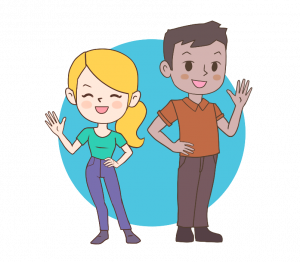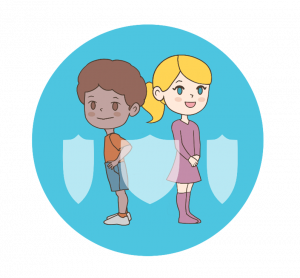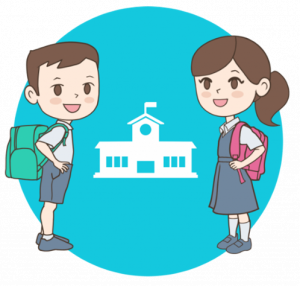Information for children and young people arriving from Ukraine
Are you under 18?
Girls and boys from Ukraine, welcome to Czechia!
Here are some questions many children have and some answers that can help you stay safe and know your rights.
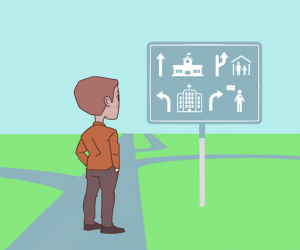 You and your family are legally safe here. No one has the right to force you to go anywhere you do not want to go.
You and your family are legally safe here. No one has the right to force you to go anywhere you do not want to go.
Children and their families fleeing from Ukraine are welcome by all countries in the region and can stay in the Czech Republic for 90 days without a visa. You and your family can also get documents called “Temporary Protection”. They will allow you to stay in the Czech Republic until at least 31 March 2024. You can come back to this page before March 2024 to learn how long you can remain in the Czech Republic.
As a child, you also have special rights to stay with your family, to go to school, to play, and to get help if you are harmed. Your ideas and feelings matter!
- Keep your documents safe: It is very important to keep any identity documents (like an ID card or passport) in a safe place. Try to make copies of them if you can. Do not let anyone take your documents away, even if they are offering to help you find housing or transportation.
- Help is free. Nobody is allowed to make you work or have a relationship with you or any other favour (things or money) in exchange for help. If anyone does this, you can report them to the police or UNHCR and ask for help.
Phone and website:
- Police Hotline (Toll-free): ? 158 or 112
- Helpline for children (Toll-free): ? 116 111
- UNHCR: ? +420 776 437 775
- Ask adults you trust to help keep you safe: If a stranger offers to take you away from your family to give you something, say ‘no’ and tell an adult you trust. Never agree to meet a stranger without first talking to an adult you trust. If you are in a situation that makes you uncomfortable or unsafe, tell someone you trust and ask for help. You have a right to protection, care, and confidential support.
- REMEMBER: it is not your fault; you are not to blame.
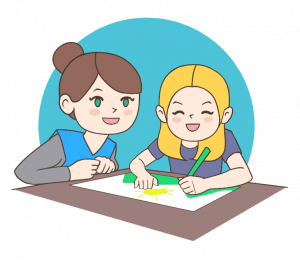 Many people want to help, but it is important to know who to trust. The Czech Government and many groups can help you with housing, food, transportation, healthcare, and school. You can ask the Czech authorities, organizations, and people like social workers, psychologists, doctors, and teachers. Look for adults who are working with an organization, and if you are not sure, you can ask to see their ID!
Many people want to help, but it is important to know who to trust. The Czech Government and many groups can help you with housing, food, transportation, healthcare, and school. You can ask the Czech authorities, organizations, and people like social workers, psychologists, doctors, and teachers. Look for adults who are working with an organization, and if you are not sure, you can ask to see their ID!
If you feel uncomfortable, you can say ‘no’. REMEMBER: Do not let anyone take away your documents (such as your ID card or passport). If they take your documents or tell you something that makes you uncomfortable, tell your family or another adult you trust. Remember you can also tell the police.
For more information on services, please go to:
- Homepage – frs.gov.cz
- Ministry of Labour and Social Affairs (mpsv.cz)
- Pomáhej Ukrajině (pomahejukrajine.cz)
If you need to speak to UNHCR, please call ? +420 776 437 775.
Yes! ? UNHCR is the United Nations organization responsible for helping refugees.
If you need information or help from UNHCR, you can email us at ? [email protected] or call us on ? +420 776 437 775.
It is a good idea to talk to your parents or a trusted adult first, but you can also contact us on your own. Please share your name, age, phone/WhatsApp number or email address, or any other way to contact you. It is a good idea to tell us the names of your parents if they are in the Czech Republic with you. If you are not with your parents, please tell us.
If you are using a shared computer to send an email, please remember to sign out of your account when you are done.
After all that you have been through, it is even more important to do everything you can to stay together with your parents or family. Simple things can help a lot.
Travel together and find housing together
- If you are in a new place: first explore it together with your family and other people you trust.
- Always tell a parent or someone you trust where you are going and when you will be back when you go out.
- Always carry phone numbers of your parents or family with you, but please be careful not to let strangers copy them or take them from you.
- Know the address where you and your family are staying and share it with someone you trust.
- Plan together for what to do if you are separated from your family.
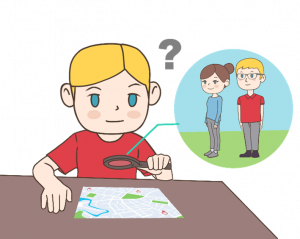 It may be difficult to find parents or relatives who are still in Ukraine right now, but it is important to tell us as much information as you can about them to help find them when this is possible. Your parents may also be looking for you and have given their details to other organizations working to get families back together. Telling us your situation can help make the connection when this is possible.
It may be difficult to find parents or relatives who are still in Ukraine right now, but it is important to tell us as much information as you can about them to help find them when this is possible. Your parents may also be looking for you and have given their details to other organizations working to get families back together. Telling us your situation can help make the connection when this is possible.
If you are searching for a family member you can contact the Czech Red Cross by emailing ? [email protected] who can also help through their Restoring Family Links service. You can learn more about it here:
When a family member becomes a missing person
If you seek family reunification, you can also contact UNHCR partner – Organization for Aid to Refugees (OPU). OPU’s main activities include providing free legal and social counselling to asylum-seekers, refugees and people of international protection. For more information, visit OPU’s website at ? https://www.opu.cz/en/ You can reach them also via email: ? [email protected] or phone ? +420 730 158 779 or ? +420 730 158 781
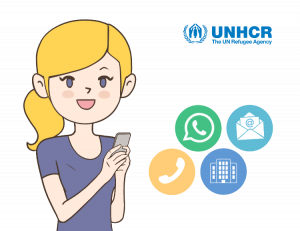 If you are in the Czech Republic alone, or without your parents or other family members, you have the right to get help from government authorities or other organisations to find a safe place to stay and be cared for. If you are not travelling with your parents or other family members, make sure you tell the authorities (Police and/or Ministry of Labour and Social Affairs), UNHCR or local organisation responsible for caring for children. They will help you to stay safe.
If you are in the Czech Republic alone, or without your parents or other family members, you have the right to get help from government authorities or other organisations to find a safe place to stay and be cared for. If you are not travelling with your parents or other family members, make sure you tell the authorities (Police and/or Ministry of Labour and Social Affairs), UNHCR or local organisation responsible for caring for children. They will help you to stay safe.
You can call any of the phone numbers below:
- Police Hotline (Toll-free): ? 158 or 112
- Child Safety Line (Toll-free): ? 116 111
- UNHCR: ? +420 776 437 775
- Organisation for Aid to Refugees (OPU) ? +420 228 229 942
It is still important to talk to government authorities, UNHCR, or other organizations and tell them who your parents are, where you think they are, and any contact information you have. They can also contact an office of the Ministry of Labour and Social Affairs, https://www.ospod.cz/.
You have a right to go to school in the Czech Republic. Public schools are free. If you are not going to school right now, you will need to approach the closest school to where you live and ask to register. Depending on your level of proficiency in the Czech language, you may have to participate in a language class arranged by the school to help you in your studies.
It is normal to feel upset after having to leave your country and seeing or hearing about so many terrifying things. It may be hard to stop thinking about what you saw or experienced. You may be separated from people you love and worry about them or about what will happen next. You may feel like nothing is familiar. Here are simple things to try that may help you cope with this difficult situation:
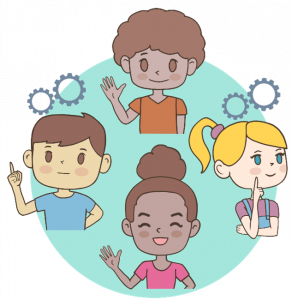 Try to keep a routine. Go to sleep and wake up at the same times each day.
Try to keep a routine. Go to sleep and wake up at the same times each day.- Try to eat regular healthy meals
- Spend time with your family and friends doing things you all enjoy
- Move your body: walk or exercise if you can
- Keep in contact with family and friends. If you cannot contact them now, write letters.
- Help others in your community.
- Take breaks from watching the news and avoid upsetting photos or videos.
If you feel angry or overwhelmed:
- Take a break and focus on breathing slowly for a few minutes
- Look for interesting things around you, like flowers, trees, or listen to bird sounds.
- Talk to someone you trust about how you are feeling.
- Ask for help from a psychologist or a counsellor– many are available for free.
If you need to speak to someone, these services provide online and phone counselling:
- The crisis intervention service line provides navigation through all range of social services, call for free ? +420 800 601 020.
- Legal and social counselling – Organisation for Aid to Refugees (OPU), the call is paid but consultations is free, ? +420 228 229 942.
- Help and Support Center for Ukrainian refugees, Mriya, the call is paid but consultations is free, ? +420 608 691 786
- UA (dumka.cz), psychological support by organization AMIGA, ? +420 778 979 211, the call is paid but consultations is free, ? +420 770 600 800.
- Безкоштовна терапія для людей, які страждають від ситуації в Україні (terapie.cz), psychological support for free for Ukrainians.
- Інформація для українців, які прибувають до Чехії – Člověk v tísni (clovekvtisni.cz), Information for citizens of Ukraine arriving in the Czech Republic, the call is paid but consultations is free, ? +420 770 600 800.
You can also find some helpful videos here: https://www.youtube.com/playlist?list=PL8TioFHubWFtb3SmM8D4ApXtktrzC36c8
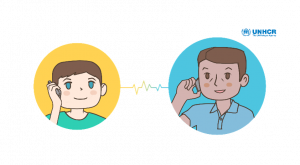 No one has the right to abuse, neglect, or mistreat any child or your family – not strangers, not parents, not relatives, and not teachers. Anyone who harms you will be sanctioned once reported.
No one has the right to abuse, neglect, or mistreat any child or your family – not strangers, not parents, not relatives, and not teachers. Anyone who harms you will be sanctioned once reported.
If someone has hurt you, touched you, or treated you in a way that makes you feel uncomfortable or scared, or if you are afraid that someone will: there are adults and organisations that can help.
If someone you know has been hurt by someone, encourage them to get help.
You can also agree on a secret word or phrase to use with family and friends. You can repeat this to them when you feel in danger so that they know you are in trouble.
REMEMBER: this is never your fault, and you are not to blame. You should not be ashamed or afraid to ask for help. If you have someone you trust, please talk to them about it.
Please call any of the below hotlines to receive help:
- Police Hotline (Toll-free): ? 158 or 112
- Child Safety Line (Toll-free): ? 116 111
- UNHCR: ? +420 776 437 775
If you are not from Ukraine but were living in Ukraine before you had to leave, you will unfortunately not be able to apply for Temporary Protection in the Czech Republic, but you can get a Departure order (called “vyjezdni prikaz” in Czech). This will let you stay in the Czech Republic for up to 30 days. It is a good idea to contact UNHCR ? +420 776 437 775 or OPU ? +420 228 229 942.
If you and your parents are travelling to other countries in the European Union that allow travel without a visa – the Schengen area- you will need a biometric passport. Biometric passports have an icon on the front that looks like an equal sign with a dot. If you do not have a biometric passport, you will not be able to travel freely to these countries even if your parents have one, unless you have been added to your parent’s passport. For more information about arriving or services in other countries, see the UNHCR site for that country.
? Do NOT ? accept offers for free transport from strangers unless you can be sure it is a safe and organised travel being supported by authorities or organisations helping those leaving Ukraine. Try to get as much information as you can about who you are travelling with, what route you will take, the address you will be staying and anyone else who may be there too and share that information with other trusted persons. Ask the people organising the transport if the person you are going with has been registered with the local authorities and what to do in case something goes wrong. They should also tell you where you need to report the fact that you got to where you were going safely.
If a person offers you free transport but cannot give you this information and has not been checked by authorities, report them to an adult you trust, the police, or organisation present.

